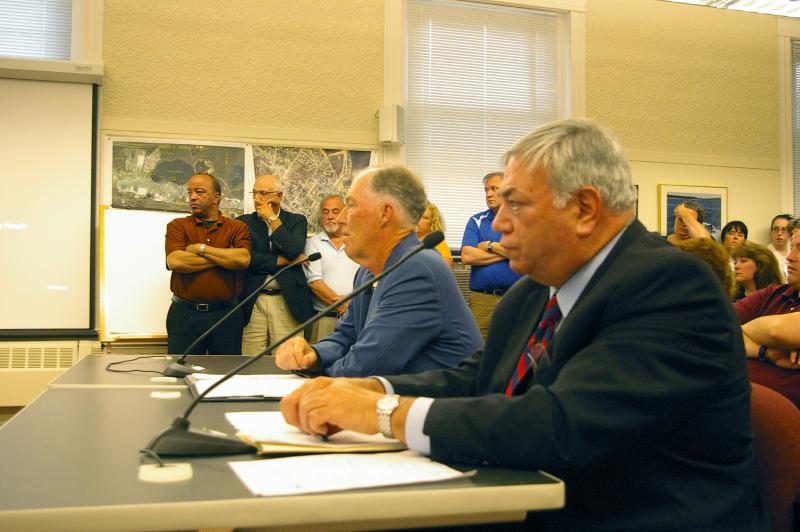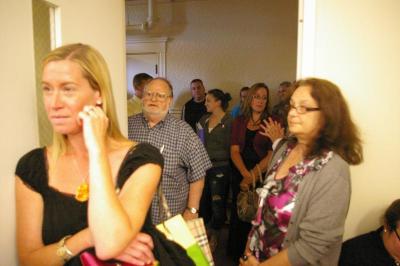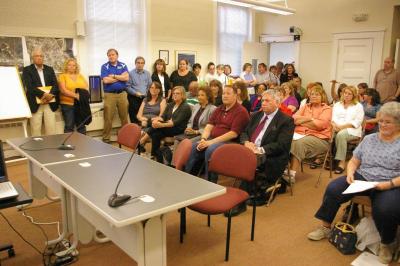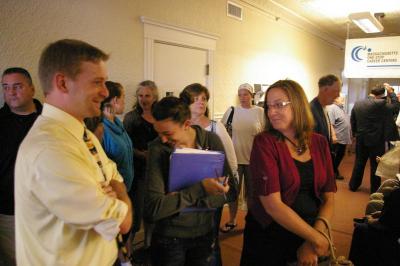Selectmen send Proposition 2½ requests to July 25 ballot
Wareham will hold a special election on July 25 to allow voters to rule on four proposals to increase taxes to fund school expenses.
Selectmen on Tuesday approved requests to put a Proposition 2½ override and three "debt exclusion" proposals on a special election ballot for voters to decide how to proceed.
If approved, money from the override would be used to rehire 21 laid-off teachers, while the three debt exclusions would pay for textbooks and technology, fund repairs to the Wareham High School roof, and pay for a "feasibility study" for renovations to Minot Forest Elementary.
The board turned down a fifth request for a debt exclusion to fund school bus purchases.
Proposition 2½ is a state law that says a municipality cannot increase property taxes more than 2½ percent above the amount it taxed the previous year.
An override increases property taxes above the 2½ percent annual cap for an indefinite amount of time – or until voters pass an “under-ride” to stop the tax increase. Debt exclusions also increase property taxes above the annual 2½ percent cap, but for a fixed period of time to pay for a specific project.
Selectmen Alan Slavin, Peter Teitelbaum, and Cara Winslow voted in favor of all four ballot questions. Ellen Begley voted against all four. Steve Holmes voted against putting the override on the ballot, but in favor of the debt exclusions.
The vote came after Superintendent Dr. Barry Rabinovitch's and School Committee Chair Geoff Swett's much-anticipated presentation about the proposals. Concerned citizens and school employees filled the Selectmen's meeting room, and still more filled the hallway.
"If we put the questions on the ballot, we're allowing the people to make a choice, we're allowing the voters to speak," Winslow argued. "These questions may not pass, or people might support them … but at least the community makes a decision, and the community can take responsibility for that decision."
A majority vote of the Selectmen is all that is required for an override to be placed on an election ballot.
If approved at the ballot, the override will allow the town to take in an additional $780,000 in property taxes, which will be used to rehire 21 teachers who were given pink slips late last month due to the uncertain budget situation.
The School Department laid off the teachers effective June 15 -- the last day of school. Rabinovitch estimated that the layoffs will cost approximately $9,000 per week in unemployment compensation unless or until the teachers can be rehired.
Rabinovitch said that the cost of the override for the owner of a median-assessed, $230,000 home, will be $50 per year.
The money from the override would be earmarked to prevent teacher layoffs for this first year. After that, the money would go into the town's "general fund," and officials from the school and town would have to decide where to spend the money.
"From the second year on, you cannot by law specify" where the money goes, Selectman Slavin noted.
The three debt exclusions that will appear on the ballot would allow the town to raise just over $1 million to repair the Wareham High School gym roof, to purchase classroom instructional materials, and to fund a "feasibility study" for the renovation of Minot Forest Elementary School, a necessary step for the town to receive state funding for the repairs and updates to the decades-old school.
The cost to the owner of a median-assessed home for all three debt exclusions would be $11.80 per year over the period of five years it will take to pay off the debt, Rabinovitch explained.
The debt exclusions required a 2/3 majority vote of the Selectmen in order to be put onto the ballot -- a "yes" vote from four out of the five members.
The question of whether to fund the purchase of new school buses through a debt exclusion did not make it onto the ballot because both Holmes and Begley voted against the proposal.
Holmes said after the meeting that he voted against the proposal because he does not believe the School Department should be running its own fleet of buses.
"We need to get out of the bus business," said Holmes, noting that many towns use outside contractors to run their transportation departments.
"If [the School Department] manages the business, and it makes money, then they should be able to reinvest the money back into the devices that make the money," said Holmes, arguing that the department should be able to afford new buses without a tax increase.
Rabinovitch said after the meeting that the budget needed to run the transportation system is not fully funded by the town and that any money earned by the Transportation Department has been used to fill in that budget gap. The department earns money by transporting students with special needs to schools in other towns, among other things.
The School Department will now have to reduce services and find other creative ways to garner the money needed to purchase new school buses, Rabinovitch explained.
"We're going to have to sell a lot of cake," he said.
After the meeting, Selectmen Ellen Begley said she voted against the measures because she did not believe the Proposition 2½ measures were a long-term solution to the School Department's budget woes.
Begley said that short-term solutions had been used in the past to balance the budget, including the use of state "stimulus" funds and the use of money from the town's Health Care Trust Fund.
"I'm not seeing a real constructive solution to the problem with the budget," said Begley, adding that the Proposition 2½ measures were "a band-aid on a gaping wound."
Begley said that the School Department had not looked at cutting down the budget in other areas, including not transporting kids to school that are not required by law to be transported, and cutting middle-management positions instead of teachers.
"I don't think [the School Department] has sat down in a room and been absolutely honest with us," said Begley, adding that the town had been "cutting, cutting, cutting," in order to balance its budget.
But Rabinovitch that the School Department was funded $250,000 less than what it was funded last year.
In response to a question from Steve Holmes about whether the Proposition 2½ measures were a "band-aid," Rabinovitch said: "I don't believe it's a band-aid," explaining that fixing the high school gymnasium roof which leaks when it rains, "so athletes running in the gym don't hurt themselves, I don't believe that is a band-aid."
During the question and answer session, Holmes also brought up the issue of whether the general public should be allowed to vote on the Proposition 2½ measures through a special election ballot.
Holmes said that some people argue the Selectmen were elected to office to make these types of decisions for the public.
"Whether the board agrees with the ideas or not...some would argue, they have already done this, the 5 people in office should be able to make this decision," said Holmes.
"I get a lot of calls on this, and quite frankly, most of them [are] not to have an election," Holmes said.
But audience member Susan Nobrega, a teacher in the Wareham High School business department who has taught at the school for 17 years, said that the right to decide belonged to the public.
"I'm so glad they decided to let the town to decide, because this isn't for 5 people, this is for the town," said Nobrega.
Michelle Fitzgerald also came to the presentation along with her daughter and Wareham High School junior Megan Fitzgerald. The two came to support Nobrega, who is Megan Fitzgerald's advisor in the high school.
Michelle Fitzgerald also said that she did not believe that it was up to the Selectmen to decide the fate of the proposition 2½ measures.
"I don't agree with that, I think the people in this community care about these kids, and I don't think it's up to five people to tell them what to think."
Megan Fitzgerald also expressed how important Nobrega was to her as an advisor and a mentor.
"She tells me when I'm not doing good so I can do good," said Megan Fitzgerald. "Especially for my senior year, I don't want a different advisor."
Michelle Fitzgerald said she appreciated Nobrega as much if not more than her daughter.
"When she's homeless because she doesn't have a job, she's going to come live with me," Fitzgerald said.
The July 25 date for the election was chosen because, by state law, a special election had to be held either before September 15 or within 90 days after the close of the Town Meeting in which voters weighed in on the Proposition 2½ measures. That discussion occurred at Spring Town Meeting, which closed on May 1.

















